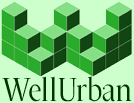Urban Eye: the Left Bank
 The Left Bank development is a very rare beast: a brand new street in the heart of the city. It links the popular, semi-bohemian Cuba Mall to Victoria Street, a major traffic artery.
The Left Bank development is a very rare beast: a brand new street in the heart of the city. It links the popular, semi-bohemian Cuba Mall to Victoria Street, a major traffic artery.Urbanism +4
Left Bank has all the ingredients for a lively, compact urban quarter: a new pedestrian street full of shops and cafés, with small businesses and homes above.
 The scale and style are appropriate for the context, with three storeys on the Cuba Mall side rising to five storeys near the centre of the block. The retail units took a while to lease, but they are now mostly occupied and the place has a pleasant buzz, especially on sunny days.
The scale and style are appropriate for the context, with three storeys on the Cuba Mall side rising to five storeys near the centre of the block. The retail units took a while to lease, but they are now mostly occupied and the place has a pleasant buzz, especially on sunny days.In some ways, it's a larger version of Willis St Village, but as the name suggests, the Left Bank is aiming for a more European, urban vibe. The main difference, though, is that it provides a new thoroughfare, thus potentially benefiting from through-traffic that a cul-de-sac like Willis St Village can't enjoy.
 Only a couple of issues prevent the Left Bank from being worth a perfect +5. First, the scungy and forbidding connection to Victoria St. Low-roofed and mostly blank-walled, it's little more than a service alley. It's a difficult situation to work with, but I hope that there are plans to liven it up, perhaps by opening some doors to the shop on the southern side.
Only a couple of issues prevent the Left Bank from being worth a perfect +5. First, the scungy and forbidding connection to Victoria St. Low-roofed and mostly blank-walled, it's little more than a service alley. It's a difficult situation to work with, but I hope that there are plans to liven it up, perhaps by opening some doors to the shop on the southern side.More seriously, apartments on the north side lacked the soundproofing required to deal with the adjacent Matterhorn bar. Building apartments next to a popular live music venue is asking for trouble, and since most new inner-city dwellers are not night owls, noise complaints were inevitable. Luckily, the Matterhorn was successful enough to afford a radical renovation (with very stylish results, though it looks like a sell-out to old-school Matterhorn regulars).
 Aesthetics +2
Aesthetics +2The low-key design and inexpensive materials have been the subject of controversy, regarded by some as cheap and nasty. On the other hand, I think that they're appropriate for Cuba St, and that the exposed plywood, industrial metals and untreated pine suit the do-it-yourself ethic of the area. There's nothing spectacular or memorable in the new architecture, but the cheery colours and unpretentious detailing make it a pleasant place to be. It's messy, heterogeneous and shabby in parts, but feels all the more organic for it.
Environment +1
There doesn't appear to be any particular environmental initiatives here (such as green roofs or solar panels), just some modest planting. The whole concept, however, supports sustainable urbanism through density and the provision of new pedestrian thoroughfares.
 Social +4
Social +4Not a Starbucks or Whitcoulls in sight! This could have been another Courtenay Central, full of chain stores and a generic food court, but instead it's a lively mix of independent one-off businesses. Inexpensive boutiques, a secondhand bookshop, quirky galleries and little cafés: it's everything that Cuba St is supposed to be. Fashion HQ, an incubator for new Wellington designers, adds to the local flavour.
Though the more upmarket apartments on the north side prompted a spat with Matterhorn, some of the residential units have been left as basic flats, thus reducing the gentrifying effect. Finally, this is a rare example of a developer-led initiative that adds to the public realm rather than privatising it.



0 Comments:
Post a Comment
<< Home